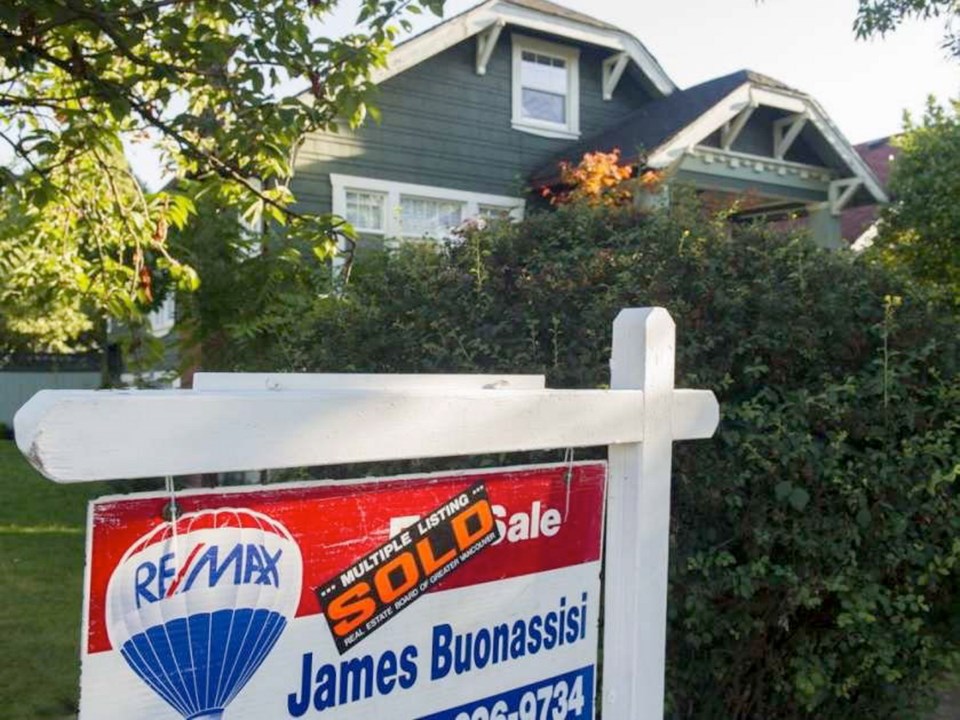House sales are down, but prices are still going up. That’s the latest message from the Real Estate Board of Greater Vancouver, but some analysts suggest the board is presenting an incomplete picture of a market on the decline.
The latest board report suggests the number of sales in the region fell by 26 per cent last month, compared to August 2015. It said the so-called “benchmark price” for all housing types increased by 31.4 per cent to $933,100 from August, 2015. The board suggests that the new foreign buyers tax, which came into effect at the beginning of this August, played at least a small role in cooling the market.
But for real estate consultant Ross Kay, figures like benchmark prices and year-on-year sales comparisons obscure what’s truly happening in Vancouver: the rapid deflation of an overvalued market that had been propped up by foreign buyers.
Take the benchmark price, a statistic that tracks sale prices of “typical” homes picked for things like age of the building, square-footage, number of rooms, and other factors.
“Your benchmark price trails what is really going on in the market by up to eight months,” said Kay, who is based in Ontario.
A better measure, he believes, is average price.
According to the real estate board, the average price for detached houses in Metro peaked in January at $1.83 million, but has since fallen to $1.47 million, a drop of nearly 20 per cent. Across all housing types, average purchase prices have fallen by 26.3 per cent since the first quarter of 2016, according to Kay.
“(It’s) the greatest single drop in Canadian history,” he said. But, “I don’t like to set off panic either, because I know the damage that is done to poor old average homeowners in these cases.”
Those in real estate defend the use of benchmark prices. Cameron Muir, the chief economist for the Real Estate Association of B.C., said that while the benchmark does lag a bit, it helps smooth out some of the wild fluctuations in average price.
“They can be quite volatile on a month-to-month basis, and that’s because … you can have more apartments selling one month or more single detached homes selling one month, and that’s going to push prices down or up when things aren’t changing for the typical home,” he said.
But Kay isn’t the only observer to suggest that the benchmark price isn’t quite giving the whole story. UBC real estate economist Tom Davidoff said that while it’s important to use a statistic that corrects for changes in the types of homes being sold, that doesn’t mean the board’s latest numbers present an accurate picture of the market.
“I believe, even quality adjusting, homes were selling for less in August than in July or June,” Davidoff said. “I think we’re actually down three or four per cent from the peak.”
The real estate board also likes to talk about the ratio of sales to active listings, which is said to measure the balance of the market. That figure is calculated by comparing the total number of sales in a month by the number of listings on the Multiple Listing Service at the end of the month. For August, there had been 29.3 sales for every 100 listings on the MLS at month’s end, which the board says is a sign we’re still in a seller’s market and prices will continue to rise.
Kay prefers to look at the failure rate, which takes into account all of the listings available in the whole month, instead of just the listings at one point in time. Using those numbers, he calculated that 80.39 per cent of all homes on the Vancouver market last month failed to sell.
“Only one in five was successful. In March, when your market was hot, 36.7 per cent were successful — double. That’s how much your market has collapsed,” he said.
Davidoff said that those numbers sounded like an accurate reflection of what’s happening in Vancouver real estate, but Muir dismissed the idea of using Kay’s failure rate to prove anything.
“This is not a measure that has been tested by anybody,” he said. “I guess it could make good headlines.”
As for the big question about the impact of the new foreign buyers’ tax, the answer is far from clear. The board says it’ll take a few more months of data to get a better idea of what’s going on. Davidoff agrees that it’s hard to measure, because sales began declining before the tax was even announced.
As for Kay, he’s predicting the tax will lead to even bigger price declines in the coming months, which could put the B.C. Liberals in a tricky position come election time.
“Everybody’s going to say ‘rescind the tax,'” he said. “Will the government now say, ‘Wait a second, we see everybody is losing, we’re going to reduce the tax’?”
The Real Estate Board of Greater Vancouver report covers sales in Whistler, Sunshine Coast, Squamish, West Vancouver, North Vancouver, Vancouver, Burnaby, New Westminster, Richmond, Port Moody, Port Coquitlam, Coquitlam, New Westminster, Pitt Meadows, Maple Ridge, and South Delta. It does not include figures for Surrey, Langley or North Delta, which are reported by the Fraser Valley Real Estate Board.



